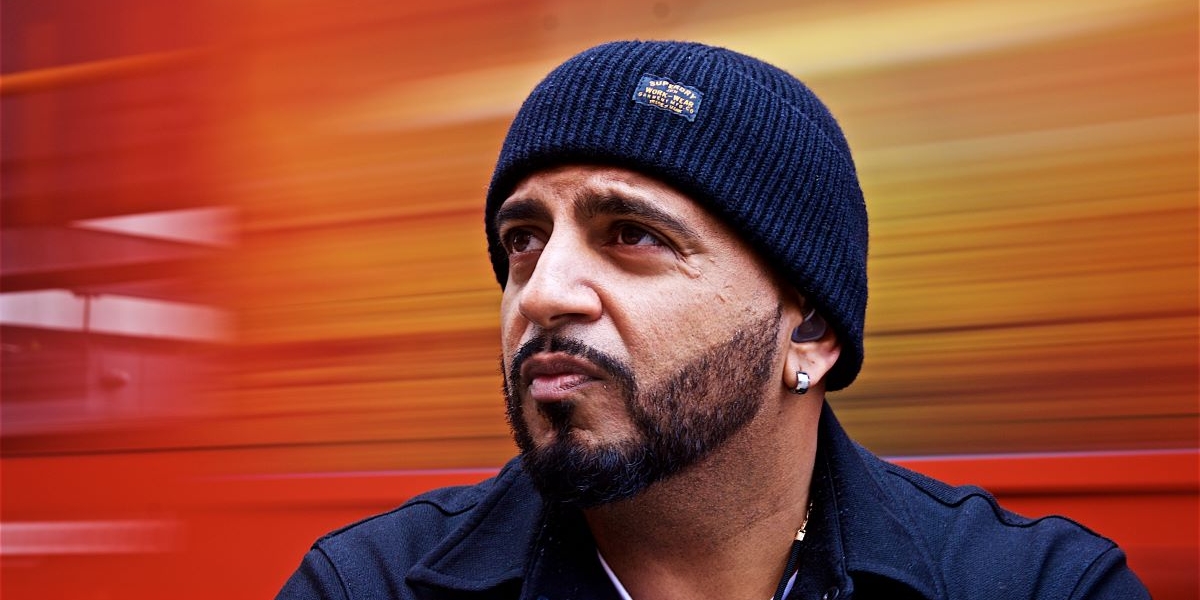Is there a more beautiful and expressive language than British Sign Language (BSL)? The Romance languages have their melodic charms, and English has its moments. But BSL can engage and emote in ways other languages cannot – even for those of us disabled by our limited knowledge of its vocabulary, syntax, and idiom.
Rinkoo Barpaga proves the point in his one-person show at the Soho Theatre. He performs an autobiographical tale of his struggles as a Deaf man from Punjabi heritage, living in Handsworth, Birmingham in the 1980s. He navigates the discrimination he faces because of his Deafness, and as a British-Asian man, and as both. Lurking in the background is Enoch Powell, and the Union Jacks of the National Front. We see excerpts of the heinous ‘Rivers of Blood’ speech in sign language. ‘Whip hand’ is an even more ugly metaphor when signed.
The subtext is the intersectionality between ablism and racism, but the main theme is identity. Abused by the neo-nazis of Birmingham, and the racists in the local Deaf Club, and dismissed by potential employers, Barpaga struggles to fit into one culture or another. ‘Am I Indian…am I British…what am I?’ he asks. The only ‘tribe’ in which he feels truly comfortable and able to be himself is the Deaf community, and his authentic language is not English, nor Punjabi, but BSL (in its urban, Brum form).
His story is delivered in BSL, with a spoken word actor verbalising the narrative. It takes us from school days, to Derby Deaf School, to Durham University, to Amritsar and the Golden Temple, and to London. There is a lot of swearing and gags (Rinkoo is also a stand-up comedian and you can tell), a great Sly Stallone impression, but also moments of great poignancy.
One is the moment when an audiologist places hearing aids in his childhood ears, and the effect was like electricity passing through his head, tempered by hearing his father’s voice for the first time. This episode reveals a fascinating culture clash between the ‘hearing world’ and the Deaf community, based on the misapprehension amongst the hearing that Deaf people want to be ‘cured’ and rescued from their deafness, and everything from hearing aids to cochlear implants provide a welcome bridge into the hearing world. A lifetime ago I was press officer for the RNID, and met Deaf people who stated that a ‘cure’ for Deafness is as insulting as a cure for Frenchness, and that cochlear implants are a form of ethnic cleansing.
The second scene which lingers in the mind is the depiction of the Jallianwala Bagh massacre (previously known as the Amritsar Massacre) in 1919. Somehow Barpaga recreates the sense of terror and panic as British Indian troops fired on a peaceful and unarmed crowd of protestors. ‘Why didn’t I learn about this at school?’ he plaintively asks. Why indeed.
There is some resolution to his inner turmoil with the recognition that Britishness can be expressed through ‘friends, football, and food’ but you get the sense that the struggle continues. His final line – ‘whilst I’m alive, I’ll keep fighting.’
This is a funny, challenging, physical piece of theatre, delivered with exuberance and great skill. A special mention to Mathias Andre, the voice actor whose job it is to keep up with the flurry of signs, slapstick, and facial expressions. Catch the show on its tour – it will be an hour of your time well spent.

